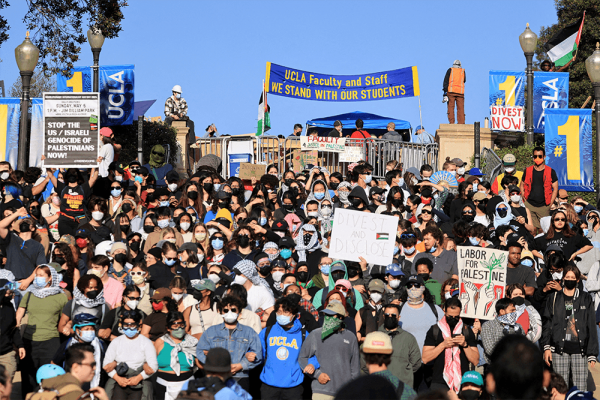Valentine’s Day is the day of romantic love. If we take our cues from advertisements, it’s an opportunity to purchase and consume flower bouquets, candies, chocolate-covered strawberries, and frilly negligees — gifts we bestow upon our beloveds to show the depths of our love.
But many of the gifts we give on Valentine’s Day are made available for our consumption through the exploitation of others; they convey romantic love at the expense of love of neighbor. I’d like to offer three examples of this reality and encourage new avenues of loving expression this holiday.
Chocolate has notoriously been linked to child labor. Just last year, the human rights firm International Rights Advocates filed a lawsuit on behalf of eight children who claim that they were treated as slaves, being “forced to work without pay on cocoa plantations” in Ivory Coast. The lawsuit implicates retail giants including Nestlé, Mars Inc., Hershey, and Mondelēz (which owns Cadbury), alleging they use exploitative labor in their supply chains.
Bouquets offend, too. The cut flower industry thrives in Latin America, at the cost of workers’ health. It is, according to Bani Amor for The Architectural Review, “a world in which … women [workers] are expected to meet high productivity over long hours exceeding the 40-hour working week.” Rose workers also endure physical stressors, including exposure to pesticides, which can cause miscarriage, cancer, and neurological problems. The cut flower industry is also linked to child labor.
And what about lingerie or other garments we don to accentuate the dynamic beauty of our bodies? They too are intimately linked to worker maltreatment. In March 2021, over 1,000 unionized Thai garment workers lost their jobs after the Brilliant Alliance Thai Global factory closed. According to Sourcing Journal, these workers had made intimate apparel for groups affiliated with Ann Taylor, Torrid, and Victoria’s Secret; some workers had been there for over a decade. Although the Thai government declared in March that Brilliant Alliance had violated Thai labor law and owed the workers $7.81 million in compensation, the factory has failed to pay. As a result, these workers — many of them women — have been left without pay for nearly an entire year. The workers had petitioned the local government this past January to utilize the country’s welfare fund to support them, after months of protest.
This situation is a grim reminder of Victoria’s Secret’s speckled past: A 2007 report published by the National Labor Committee, an organization that advocates for workers' rights, detailed exploitative labor conditions in their production facilities in Jordan, and in 2011 Bloomberg reported the company’s cotton sourcing was linked to child labor. The latter report documented that the involved farm was certified as organic and fair trade — a jarring reality check for fair trade enthusiasts.
Victoria’s Secret’s involvement in labor scandals may come as a surprise, given the company’s emphasis on social justice and pledge to become “the world’s leading advocate for women.” And confectionary brands share similar sentiments. Mars recently announced a revamp of M&Ms candy to embody current corporate commitments to gender balanced leadership, annual diversity audits in advertising, and other just involvements, to help “create a world where society is inclusive.”
But talk is cheap. Victoria’s Secret pays lip service to women’s empowerment while ignoring the plight of the women producing their products. And though Mars Inc. waxes poetic about celebrating different cultures, backgrounds, and generations, its operations in West Africa bespeak indifference in the face of forced child labor. Their words, as we see, are mere platitudes — cheap talk woven together with social justice lingo to placate justice-oriented consumers and obscure corporate malfeasance.
Sadly, worker exploitation and abuse are part and parcel of these massive industries — and although I’ve limited my comments to just chocolate, flowers, and lingerie, the list of complicit industries — from agriculture to diamonds — is too long to list.
These findings are a tough pill to swallow for consumers and activists alike. After all, writes Amor, “no one wants to think of labour exploitation while buying Fairtrade-certified Ecuadorian roses at Whole Foods.” But as indicated by Bloomberg’s cotton farm investigation, even organizations with ethical certifications fall short. This leaves little guidance for concerned consumers besides despair or begrudged acceptance.
We may feel motivated to strive for deeper, truer demonstrations of love, sourcing gifts that bear a less pronounced linkage to exploitation and harm. But this overemphasis on consumer action to ameliorate corporate failings is an easy trap set by neoliberalism. While it’s good to opt for locally made gifts made by well-paid and protected workers, isolated reliance on individual actions to “do good” obscures corporate responsibility while generating newfound scruples for consumers. In other words: Consumers do not bear the most responsibility, yet we are led to believe that if we just buy different, better things, the world will be better. And when these actions do not quell the widespread suffering of global workers, we are left devastated.
It is here, amid our constraints, that grace finds us. By grace, I mean the spontaneous, divine gift that welcomes our limitations, while holding them in contrast to the boundlessness of God’s unfathomable, transcendent, perfect love. This perfect love contrasts the hollow “love” promised to us by our participation in consumer capitalism, challenging the lie that goods wrought by human suffering capture the depths of our romantic, fraternal, and communal commitments.
This kind of love allows us to encounter the world anew. We see the empty promises of the market for what they are, and can begin to interrogate our entanglement in goods and systems that exploit, oppress, and destroy. We further recognize the provocations of neoliberalism as distractions from meaningful coalition building and community organizing; we cannot just buy fair trade flowers and expect systemic change. Engaging this grace not only produces a shift in our perspective — but it also alters our decision-making. We are challenged here to face our responsibility to others not as a reminder of our guilt nor a way to stave off sin, but rather as an opportunity to demonstrate love more honestly, in light of our limitations.
How, then, might we inhabit a loving perspective, in the face of consumerist frenzy?
Responding to the cries of our exploited neighbors requires us to reconsider our priorities, pursuing actions that attend not only to romantic love, but also to love those laboring for us. We can no longer settle for commercialized simulacra — the box of chocolates, the bouquet, the brassiere — that claim to convey devotion while trampling upon the dignity of people who too deserve to be loved and respected.
To put these words into practice, we should pair Valentine’s purchases with acts of solidarity. If you’ve already ordered the bouquet, or bought the lingerie and chocolates, don’t despair. Instead, explore ways to advocate for workers — such as signing petitions (like this one for Thai garment workers), joining pressure campaigns, contacting brands, and supporting policy that protects workers’ dignity. These pursuits, though imperfect, embody the earnest love of an advocate — committed to nourishing self, community, and planet, despite human limitation.
John Donne’s reminder that no one “is an island” rings true in our globalized world. Valentine’s Day should serve as a calendar reminder of our communal connection, and our responsibility toward people whose labor assists in proclaiming our love.
Got something to say about what you're reading? We value your feedback!







